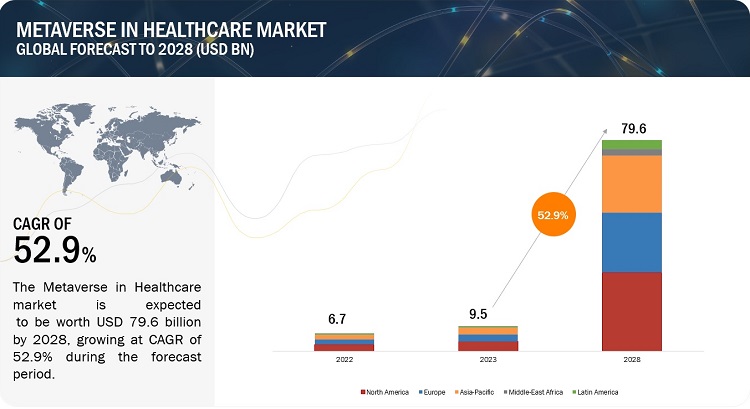The size of global metaverse in healthcare market in terms of revenue was estimated to be worth $9.5 billion in 2023 and is poised to reach $79.6 billion by 2028, growing at a CAGR of 52.9% from 2023 to 2028. The comprehensive research encompasses an exhaustive examination of industry trends, meticulous pricing analysis, patent scrutiny, insights derived from conferences and webinars, identification of key stakeholders, and a nuanced understanding of market purchasing dynamics.

Metaverse in Healthcare Market Dynamics
Driver: Increasing adoption of mixed reality for performing minimally invasive surgeries
In the healthcare industry, mixed reality (MR) is being used for the first time to convey important information to operating surgeons via a hands-free interface. MR helps healthcare providers simplify medical procedures while also keeping patients safe. One of the important sectors for the introduction of MR is healthcare, which includes surgical simulation, phobia therapy, robot training, and expert training, among other things.
Restraint: Data privacy and security concerns
The increasing use of automated healthcare technologies offers greater reach and efficiency in healthcare delivery but has high-security risks due to the broader access offered. Cybercriminals frequently target the healthcare industry with cyberattacks to exploit and manipulate information to their benefit. Furthermore, as the number of patients increases, so does the volume of patient data. Despite the initial findings of metaverse applications being encouraging, a significant impact of metaverse technologies has not been witnessed yet. The growing public awareness of data privacy issues has put pressure on countries to enact stricter privacy legislation. However, developing technologies such as the metaverse, VR, and AR will make enforcing data privacy legislation more difficult in the future.
Opportunity: Increasing use of metaverse in medical education and training
The market for metaverse in education is expected to grow at a significant rate in the coming years. The application of XR in education has a promising future, and EdTech companies have an attractive opportunity to flourish in the metaverse. Leading market players are entering the ecosystem and embracing digital transformation, which is propelling market growth. XR technologies are significantly changing medical education, such as surgical training, medical test visualization, medical therapies, and drug development.
Challenge: HIPAA regulations for healthcare metaverse
The US healthcare system is overseen by complex state and federal legislation, including HIPAA (Health Insurance Portability and Accountability Act) requirements. HIPAA compliance is established as a standardized way for safeguarding sensitive patient data and medical records, including PHI and ePHIs. HIPAA prohibits the random distribution of patient information without patient consent.
The metaverse has the potential to provide a wide range of healthcare services, from mental health therapy to dermatology appointments. The regulations involved will depend on how services are delivered, as well as how they are funded and paid for. For example, services billed to Medicaid or Medicare must adhere to regulations that may not apply to services paid for in cash. Some technology platforms are being developed to accept cryptocurrency payments for health services provided in the metaverse. The compatibility of current regulatory and payer systems with cryptocurrency payments is a grey area, especially given the cryptocurrency movement’s emphasis on deregulation and decentralization.
North America accounted for the largest share of the metaverse In healthcare industry during the forecast period.
In 2022, North America accounted for the largest share of the market, followed by Europe, Asia Pacific, Middle East & Africa and Latin America. The adoption of metaverse solutions for healthcare applications is expected to be the highest in North America (compared to other regions). North America is the leading market in terms of developing cutting-edge technologies used in display devices.
Prominent players in the Metaverse in Healthcare Market include:
- Microsoft (US)
- NVIDIA Corporation (US)
- XRHealth (US)
- CAE Inc. (Canada)
- Koninklijke Philips N.V. (Netherlands)
- ImmersiveTouch, Inc. (US)
Recent Developments of Metaverse in Healthcare Industry:
- In March 2023 NVIDIA Corporation (US) partnered with Microsoft (US) , This collaboration will help connect Microsoft 365 applications and NVIDIA Omniverse to digitalize their operations, engage in the industrial metaverse, and train advanced models for generative AI and other applications
- In February 2023, Wipro (India) launched Decentralized Identity and Credential Exchange (DICE) ID, which enables the insurance and verification of tamper-proof, self-verifiable digital credentials for current or potential healthcare or financial service providers, as well as educational institutions.
- In November 2022, GE Healthcare (US) collaborated with MediviewXR(US) . This collaboration was aimed at developing the OmnifyXR medical imaging system.
Conclusion:
The Metaverse in the healthcare market represents a revolutionary integration of advanced virtual and augmented reality technologies into medical practices, promising substantial enhancements in patient care, medical training, and overall healthcare delivery. As the sector evolves, the adoption of metaverse technologies is anticipated to drive significant improvements in surgical precision, remote consultations, patient engagement, and therapeutic interventions.
